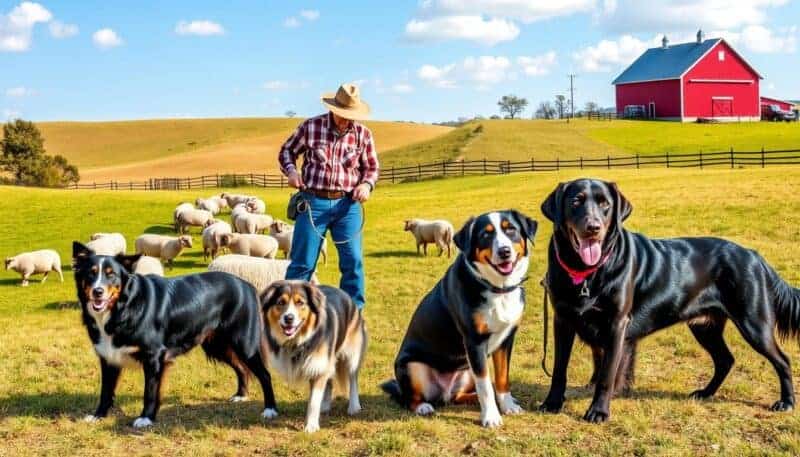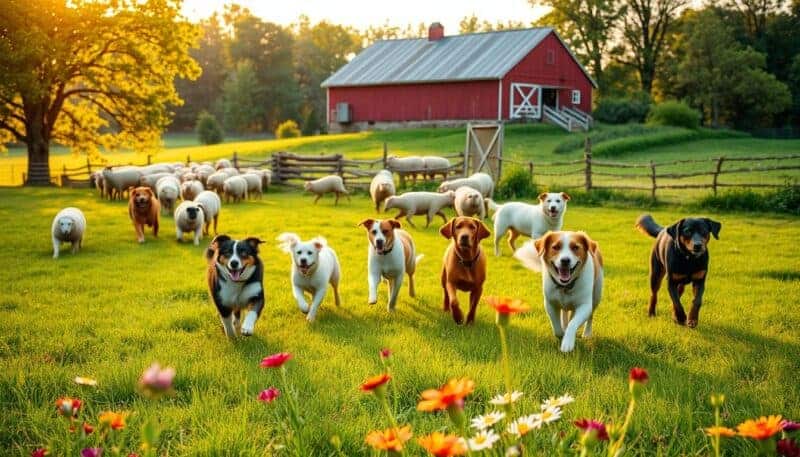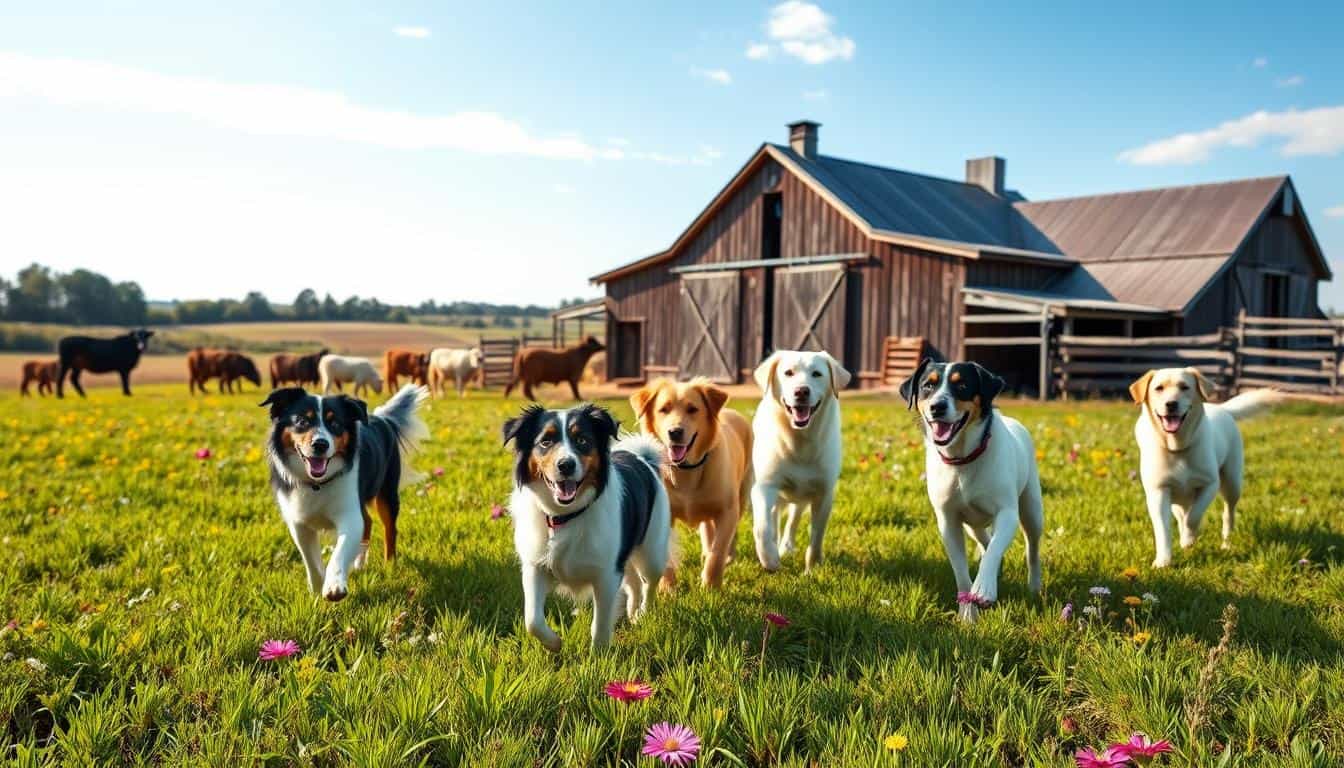Introduction
As a proud farm owner, I know how much four-legged friends can help your farm. Farm dogs are not just loyal pets; they are key partners in keeping your land productive. They can help herd animals or protect your property, making a big difference.
In this guide, we’ll look at the best farm dog breeds for your rural home. From the agile Australian Cattle Dog to the hardworking Border Collie, each has special skills for your farm. Learn about their history and how they help farms today.
- Understanding the Role of Working Dogs on Farms
- Essential Characteristics to Look for in Farm Dogs
- Top Herding Breeds for Your Farm
- Livestock Guardian Dogs: Your Property's Protectors
- Farm Dogs: Choosing the Right Breed for Your Needs
- Training Requirements for Working Farm Dogs
- Health Considerations for Rural Working Dogs
- Housing and Care Requirements
- Multiple Farm Dogs: Managing a Working Pack
- Cost Considerations and Investment Value
- FAQ:
- Which is the best dog for farm?
- What kind of dog lives on a farm?
- Can pitbulls be farm dogs?
- What dog is used on a chicken farm?
- What is a good farm dog name?
- What makes the best farm dog?
- How do livestock guardian dogs protect a farm or ranch?
- What factors should I consider when selecting the right farm dog breed?
- How much training do working farm dogs require?
- What are the common health considerations for farm dogs?
- How do I manage a pack of working farm dogs?
Understanding the Role of Working Dogs on Farms
Working dogs have been a big part of farm life for centuries. They help manage livestock, protect property, and keep farms running smoothly. The dogs have evolved with time, to be able to meet needs of modern farming.
Historical Significance of Farm Dogs
Humans and dogs have been working together for thousands of years. Our ancestors first domesticated wolves to help with herding, guarding, and hunting. As farming grew, certain dog breeds became key to farm success. They helped control and protect livestock and warned humans of dangers.
Modern Day Applications
Today, working dogs are still crucial on farms and ranches. Herding dogs like the Australian Cattle Dog and Border Collie help move and manage livestock. Livestock guardian dogs protect animals from predators, keeping them safe.
Key Traits of Successful Farm Dogs
- Keen Herding Instinct: The ability to intuitively herd and control livestock, following the natural movements and behaviors of animals.
- Protective Instinct: A strong drive to guard and defend their territory, herd, and human companions from potential threats.
- Endurance and Stamina: The physical capabilities to work long hours, navigate challenging terrain, and maintain a high level of activity throughout the day.
- Adaptability: The flexibility to thrive in diverse environments, from open fields to rugged landscapes, and to adjust to changing weather conditions and work requirements.
These traits, along with training and socialization, make some dog breeds essential on farms. They help manage farms efficiently and successfully.
Essential Characteristics to Look for in Farm Dogs
Choosing the right farm dog is key. They need traits that fit rural life and work well. These qualities help them succeed and thrive on farms.
Intelligence, trainability, stamina, and loyalty are crucial. Farm dogs must learn fast and follow commands well. They work hard, from herding to guarding, and stay true to their working dogs role.
| Characteristic | Significance for Farm Dogs |
|---|---|
| Intelligence | Allows for efficient training and problem-solving on the farm |
| Trainability | Enables dogs to learn and execute a wide range of farm-related tasks |
| Stamina | Ensures dogs can keep up with the physical demands of farm work |
| Loyalty | Fosters a strong bond between the dog and their rural protectors, creating a dedicated working relationship |
Focus on these key traits when picking a farm dog. This way, you know they’re ready for farm life’s challenges.
Top Herding Breeds for Your Farm
There are a few herding dog breeds that really stand out for farm work. The Australian Cattle Dog and the Border Collie are top choices. They help manage livestock and keep your farm in order. Let’s look at the best herding breeds for your farm.
Australian Cattle Dog
The Australian Cattle Dog, or “Blue Heeler,” is a hardworking and smart breed. They have a strong herding instinct and lots of energy. These dogs are great at managing cattle, sheep, and other animals on big farms.
Border Collie
The Border Collie is famous for its herding skills. They come from Scotland and England’s border areas. These dogs can read animal movements well, making them very efficient at herding. They are easy to train and work hard, making them perfect for any farm size.
German Shepherd
German Shepherds are known for guarding, but they also make great herding dogs. They are smart, well-behaved and simple to train. They are brave, loyal, and work hard to protect and manage their herd.
Choosing the right herding dog for your farm is key. Think about your farm’s needs and the dog’s temperament and work style. The right dog will help manage your livestock well, making your farm successful.
Livestock Guardian Dogs: Your Property’s Protectors
Livestock guardian dogs are your best friends when it comes to keeping your farm or rural land safe. They are bred to protect your farm dogs and rural protectors from predators. This keeps your livestock safe and your land healthy.
These dogs are very independent and fiercely protective. They don’t herd like other dogs do. Instead, they keep predators like coyotes and wolves away from your farm.
Livestock guardian dogs are calm and fit right in with the countryside. They are big and loyal, making them great at keeping predators away.
“These dogs are true rural protectors, safeguarding not just your livestock, but the very essence of your farm’s security and tranquility.”
Looking for a way to keep your property safe? Think about getting a livestock guardian dog. They will be your land’s loyal protectors, keeping everything safe for a long time.
Farm Dogs: Choosing the Right Breed for Your Needs
Choosing the right farm dog breed can greatly improve your farm’s productivity and safety. Whether you have a small hobby farm or a large ranch, knowing what to look for is key. This will help you find the perfect dog for your needs.
Property Size Considerations
The size of your farm or ranch is important when picking a dog breed. For smaller areas, breeds like the Border Collie or Australian Cattle Dog are great. They are agile and quick. Larger farms need dogs with more stamina, like the German Shepherd or Great Pyrenees.
Climate Adaptability
Your farm dog must be able to handle your local weather. In hot, dry climates, breeds like the Kuvasz or Anatolian Shepherd are good. They can handle the heat. For cold winters, breeds like the Maremma Sheepdog or Bernese Mountain Dog are better.
Work Requirements
Think about what tasks your farm dog will do. Herding breeds, like the Welsh Corgi or Collie, are great for moving animals. Guardian breeds, such as the Great Pyrenees or Akbash, protect your property and animals from predators. Choose a dog that fits your farm’s needs.
“A well-trained farm dog can be an invaluable asset, increasing the efficiency and security of your land and livestock.”
By considering your property size, climate, and needs, you can pick the best farm dog. This dog will thrive in your environment and help your farm succeed.
Training Requirements for Working Farm Dogs
Raising working dogs, whether they’re herding dogs or farmhand canines, takes a lot of time and effort. They need proper training to do their jobs well on the farm. These smart and hardworking animals are key to the farm’s success.
It’s important to socialize working dogs early. Introduce them to different people, animals, and places. This helps them grow confident and adaptable for the farm’s changing needs. Start training them positively as soon as they join your family.
- Obedience Training: Working dogs need to learn basic commands like sit, stay, come, and heel. This keeps everyone safe and in control on the farm.
- Specialized Tasks: Farmhand canines might need extra training for herding, guarding, or helping with farm tasks. It depends on their breed and role.
- Socialization and Desensitization: Herding dogs must get used to being around big animals. They need to handle the farm’s sights, sounds, and smells.
Putting time and money into training working dogs is worth it. They become essential to the farm, making work easier and more efficient. Their training helps the farm run smoothly.

“A well-trained working dog is a true partner on the farm, capable of anticipating your needs and acting with precision and efficiency.”
Health Considerations for Rural Working Dogs
Farm dogs and other working dogs in rural areas face big challenges. Their health is key to their success. These rural protectors need special care to stay healthy.
Common Health Issues
Farm dogs can get hurt easily, like sprains or torn ligaments. Some breeds might get hip or elbow problems. These issues can make it hard for them to do their jobs.
Preventive Care
- Regular vet visits to catch health problems early
- Good food and water to keep them strong
- Shots and flea control to keep them safe
- Regular grooming and hoof care
Exercise Requirements
Working dogs need lots of exercise to stay fit. They need a plan that fits their job and their needs. This could be herding, guarding, or fun activities like hiking and swimming.
“The health and well-being of our rural protectors are vital to the success of our farm operations. Investing in their preventive care and meeting their exercise needs ensures they can continue to serve as our trusted companions and valued assets.”
Housing and Care Requirements
Raising farm dogs, your loyal farming companions and ranch dogs, means giving them a comfy and safe place to live. They need a spot that meets their needs as working dogs in the countryside.
Good housing for farm dogs could be a cozy kennel or a big area with shade. It’s important to have good air flow, enough space to move, and protection from the weather. They also need a comfy spot to sleep, like a raised bed or a waterproof shelter.
When it comes to feeding, farm dogs need food that’s full of nutrients to keep them going. Talk to a vet to figure out how much and how often to feed them. It’s also key to always have fresh, clean water available.
Grooming needs can change based on their fur. Regular brushing, baths, and nail cuts help keep them healthy and prevent mats. Also, watch for ticks, fleas, and other pests that are common in the country.
Dogs need daily exercise and training to stay happy and healthy. Activities like herding, obedience, or agility keep them fit and strengthen your bond with them.
| Housing Considerations | Feeding Requirements | Grooming Needs | Exercise and Training |
|---|---|---|---|
| Insulated kennel or spacious run with shade | Nutrient-dense diet, consult veterinarian | Regular brushing, bathing, and nail trimming | Herding exercises, obedience training, agility |
By giving them the right home, food, grooming, and exercise, you’ll keep your farm dogs happy and healthy. They’ll be a big part of your rural property.

Multiple Farm Dogs: Managing a Working Pack
Keeping a group of farm dogs can be both rewarding and tough. It’s important to know how your dogs work together and how to share tasks. This helps keep your farm running smoothly and your dogs happy.
Pack Hierarchy
It’s key to have a clear leader in your pack of farm dogs. Find out who the top dog is and make sure they know they’re in charge. This order helps avoid fights and keeps the peace among your dogs.
Integration Strategies
When you bring new farm dogs into your group, do it slowly and carefully. Let them meet in a neutral place and watch how they act. Spend time with each dog to build trust and help them fit in well.
Work Distribution
- Figure out what each working dog is good at.
- Give them jobs that match their skills and personality.
- Change up their tasks to keep them interested and avoid burnout.
- Check how well the pack is doing and adjust their work as needed.
By understanding your farm dogs and managing them well, you can have a strong and helpful team. This team will help your farm succeed.
Cost Considerations and Investment Value
Adding farm dogs to your farm costs money upfront. But, the long-term gains can be huge. You’ll need to pay for the dog, vet visits, training, and gear like collars and kennels. Then, there are ongoing costs for health care, grooming, and food.
Farm dogs are priceless for your farm or ranch. Farm dogs and working dogs help manage livestock guardians, herd animals, and keep predators away. This boosts your farm’s productivity and safety, saving you money and increasing profits.
Think about the time and effort you’ll save with farm dogs. They make handling livestock easier and reduce losses from predators. Plus, having a reliable dog on your property brings peace of mind. Choose the right breed to get the most value from your farm dog investment.
FAQ:
Which is the best dog for farm?
The best dog for a farm is typically a farm dog known for its versatility and intelligence. Breeds like the Border Collie, Australian Shepherd, and Anatolian Shepherd excel in herding, guarding, and protecting livestock. Their work ethic and ability to adapt to farm life make them invaluable companions for farm owners.
What kind of dog lives on a farm?
Farm dogs are typically breeds that excel in herding, guarding, and helping with livestock. Common choices include Border Collies, Australian Shepherds, and Great Pyrenees. These dogs are highly intelligent, hardworking, and protective, making them essential for maintaining order and ensuring the safety of both animals and property on a farm.
Can pitbulls be farm dogs?
Pitbulls can be effective farm dogs under the right conditions. Known for their strength, loyalty, and protective nature, they can serve as guardians for livestock. While not traditionally used for herding, their keen instincts and versatile skills make them valuable companions on a farm, especially for guarding against predators.
What dog is used on a chicken farm?
On a chicken farm, farm dogs such as the Border Collie, Australian Shepherd, or the Anatolian Shepherd are commonly used. These dogs excel in herding and guarding livestock, including poultry. Their keen instincts and protective nature make them valuable in managing and safeguarding chickens from predators and maintaining order on the farm.
What is a good farm dog name?
A good farm dog name should reflect strength, loyalty, and the hardworking nature of farm dogs. Names like “Rusty,” “Shadow,” or “Buck” evoke a sense of reliability and endurance. These names are well-suited for dogs that help with herding, guarding, and overall farm tasks, making them ideal companions for rural life.
What makes the best farm dog?
A good farm dog needs to be smart, easy to train, and have lots of energy. They should also be loyal and able to adapt to farm life. These qualities help them herd, guard, and be great companions.
How do livestock guardian dogs protect a farm or ranch?
Livestock guardian dogs keep predators away from animals. They are big, independent, and protective. This makes them perfect for keeping coyotes and wolves off your farm.
What factors should I consider when selecting the right farm dog breed?
Think about your farm’s size, the weather, and what work you need done. For example, Australian Shepherds are great at herding. Anatolian Shepherds are better for guarding in hot weather.
How much training do working farm dogs require?
Farm dogs need a lot of training and socialization. Start training early and use positive methods. This helps them learn and obey on the farm.
What are the common health considerations for farm dogs?
Farm dogs can get joint problems, heat sickness, and injuries. Keep them healthy with regular vet visits, good food, and lots of exercise.
How do I manage a pack of working farm dogs?
Managing a pack means setting a clear order and introducing new dogs carefully. Make sure each dog knows their role. This helps the team work well together.
Share your thoughts in the comments below! If you enjoyed this post, consider subscribing to our newsletter for more pet tips, stories and blogs!

